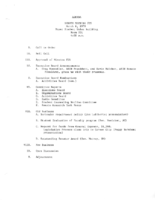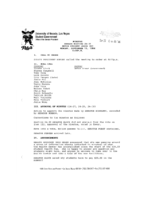Search the Special Collections and Archives Portal
Search Results
Blanch Jackson Photograph Collection
Identifier
Abstract
The Blanch Jackson Photograph Collection (approximately 1900-1941) contains black-and-white photographic prints and negatives from the Jackson family’s life in Tonopah, Nevada and their travels to mining sites in Nevada and Arizona. Blanch, her husband Clyde, her father-in-law Colonel David Howell Jackson, their two sons, and some acquaintances are pictured in the photographs.
Archival Collection
Artemus W. Ham Family Papers
Identifier
Abstract
The Artemus W. Ham Family Papers (1857-1970) contain postcards written by family members, newspaper clippings about the Ham family, and a Nevada Senate Concurrent Resolution memorializing Artemus W. Ham, Sr. Also included are genealogy notes, a commencement program from Michigan Law School, and membership cards of Artemus W. Ham, Sr.
Archival Collection
Allied Arts Council of Southern Nevada Records
Identifier
Abstract
The Allied Arts Council of Southern Nevada (AACSN) Records are comprised of the organizational records of the Allied Arts Council, a Las Vegas, Nevada-based non-profit organization that promoted the arts and cultural life in Southern Nevada from 1971 to 1999. Materials include meeting minutes, financial records, correspondence, membership information, publications, event information, project files, photographs, audio cassettes, VHS, and U-Matic tapes.
Archival Collection
Gary Sternberg Papers
Identifier
Abstract
The Gary Sternberg Papers are comprised of correspondence, publications, and videos documenting Sternberg's involvement with the Las Vegas Jewish community from 1983 to 2015. Organizations represented in the collection include Congregation Ner Tamid and the Holocaust Survivors Group of Southern Nevada. Also included are digital photographs of Sternberg in 2015 wearing his Caesars Palace dealer's uniform.
Archival Collection
Chris Giunchigliani Political Papers
Identifier
Abstract
The Chris Giunchigliani Political Papers (1986-2019) document Giunchigliani's career as a member of the Nevada Assembly as well as her involvement as a Clark County Commissioner. The majority of the collection is a "newspaper and document archive" which consists of media articles and newspaper clippings collected by Giunchigliani's office that mention Giunchigliani throughout her political career. The collection also includes campaign materials such as mailers and photographs. Interviews Giunchigliani did with local news networks in Las Vegas, Nevada as well as televised campaign advertisements for the Clark County Commission election are represented in the collection. Other materials include legislative research files for bills on gypsum reclamation, development near Red Rock Canyon, education reform, and funding to build an NFL stadium in Las Vegas. The collection also includes a certificate of commendation from Senator Harry Reid and thank you cards from schoolchildren.
Archival Collection

Pablo Macias oral history interview: transcript
Date
Archival Collection
Description
Oral history interview with Pablo Macias conducted by Elsa Lopez, Monserrath Hernandez, and Claytee D. White on December 07, 2019 for the Latinx Voices of Southern Nevada Oral History Project. Pablo Macias was rasied in the small town of Carlin outside of Elko, Nevada. His father and mother met in Ogden, Utah where his father was working on railroad in Nevada and Utah. After finishing high school, he got a job at Elko Blacksmith Shop, where he learned to weld. After attending Northern Nevada Community College, he enrolled and graduated from UNR. After graduation, he took a position at Von Tobel Middle School in 1990 teaching Spanish and Physical Education. While working as a Spanish teacher in Rancho High School he enrolled in a Master's program at Nova Southeastern University, completing the program in education administration. He currently serves as the Associate Director of Corporate Work Study Program Operations for Cristo Rey St. Viator College Preparatory High School. Subjects discussed include: Education, Rancho High School, Von Tobel Middle School, Barrick Mining, and Cristo Rey.
Text

Della Coates interview, March 18, 1978: transcript
Date
Archival Collection
Description
On March 18, 1978, collector Bill Hitchcock interviewed Della Coates (b. June 17th, 1919 in Birmingham, Alabama) at her home in Las Vegas, Nevada. In the interview, Della Coates discusses her time working for the telephone company. She also speaks about the changes in education and about changes throughout Las Vegas.
Text

Meeting minutes for Consolidated Student Senate, University of Nevada, Las Vegas, March 06, 1979
Date
Archival Collection
Description
Text

Transcript of interview with Sherwin "Scoop" Garside by David Anderson, March 25, 1976
Date
Archival Collection
Description
On March 25, 1976, David Anderson interviewed Sherwin “Scoop” Garside (born May 26, 1915 in Tonopah, Nevada) about his life in Southern Nevada. Garside first talks about his father’s business in running an early Nevada newspaper and his personal knowledge of the early mining that took place in different parts of Nevada. He also talks about living in the town of Tonopah, the American Indians who lived in the area, and his experiences from living in Las Vegas. Garside also mentions the beginnings of gambling in Las Vegas, the population boom periods of Las Vegas, and his experiences in witnessing the aboveground atomic testing.
Text

Meeting minutes for Consolidated Student Senate University of Nevada, Las Vegas, September 19, 1994
Date
Archival Collection
Description
Text
